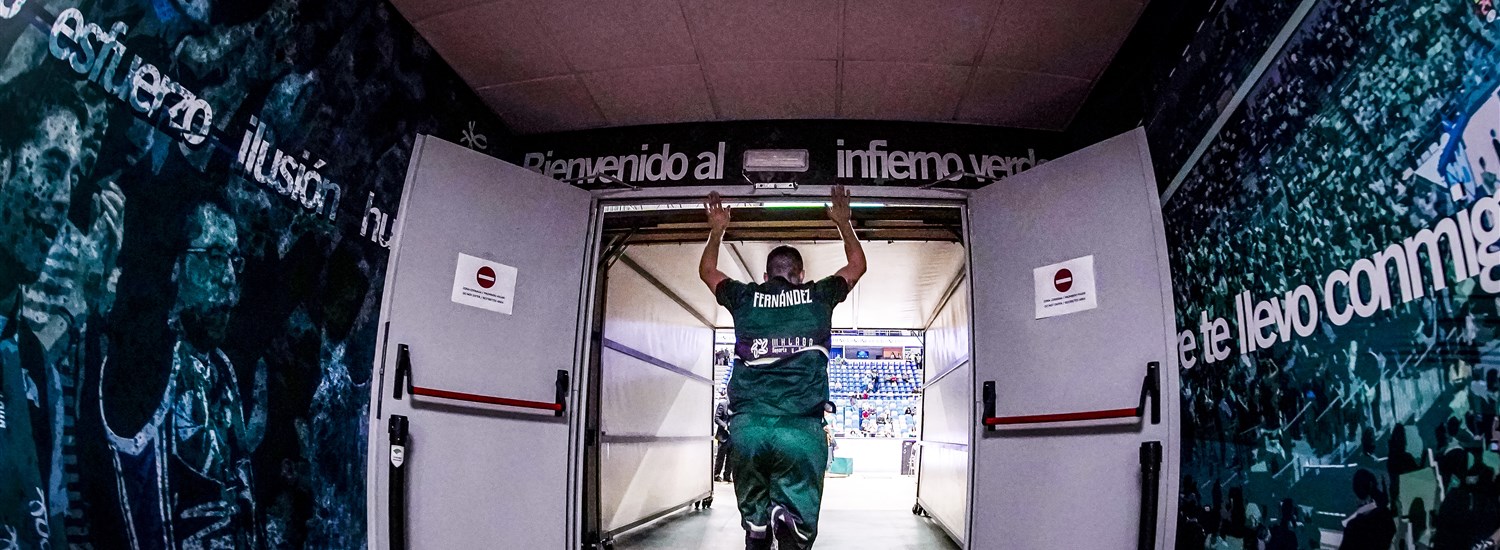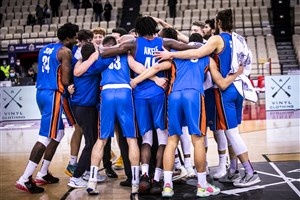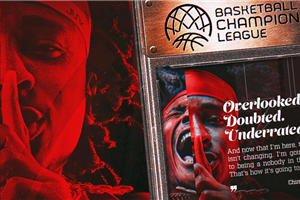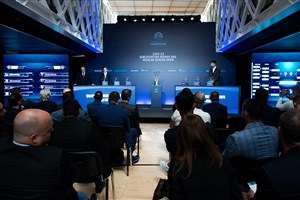
Changes - a closer look at Unicaja
MALAGA (Spain) - When Unicaja finally took the plunge and joined the Basketball Champions League, it made waves across the European basketball landscape. After topping their group in the Regular Season and carrying the best-rated defense in the league for most of the season so far, they are still very much on track to maximize that decision. In fact, if we look at the data viz below we can see that despite a disappointing loss at home to this season’s revelation Cluj Napoca in the Round of 16, Unicaja still have the second-best Defensive Rating at 98.3 points conceded per 100 possessions and also have the second-best Net Rating at +11.8 points per 100 possessions, behind only the rampaging MHP Riesen Ludwigsburg.
Head coach Fotios Katsikaris is himself no newcomer to the BCL, having experienced the competition with the then-named Iberostar Tenerife in 2017, the club he was with directly before a stint with the Utah Jazz as an assistant to Quin Snyder. Now in his third year back in Europe, Katsikaris spoke to us about how the BCL has changed since his first experience, the way the NBA has changed his coaching philosophy, and what it would mean to this club to taste European success again.
"The league has absolutely improved a lot," said Katsikaris. "We see a competition that is growing, with small steps but the right steps," he said before elaborating, "I like the format, it’s very human in a sense."
 Fotios Katsikaris feeling at home
Fotios Katsikaris feeling at home
That human format with open entry based on sporting criteria has seen three out of the four teams from the Qualifiers make it to the Round of 16 but as Unicaja have found out against Cluj Napoca, human doesn’t mean weaker. "The level is high, we felt it in our schemes when we prepared for Lavrio and Dijon. Supposedly we were favorites to win those games and we lost," said Katsikaris.
The Jazz
So, the league has changed but how much has Fotios Katsikaris changed since his last time in the competition with Tenerife? After replacing Igor Kokoskov as the international representative on the staff of the already heavily internationally influenced Utah Jazz, Katsikaris found himself on call twenty-four hours a day working for the brilliant but notoriously demanding Quin Snyder. "He’s a great teacher, very demanding, close to the European philosophy coach," he said whilst describing Snyder. "He lives basketball 24 hours a day, you gotta be always ready because you can receive a text message at three in the morning," he recalled, "That’s true that happened," affirmed Katsikaris, as if to say that sometimes reputation can become a myth but not in this case.
But it was much more than just the non-stop work ethic that left an imprint on Katsikaris. The NBA is well known for the incredible levels of organization that it takes to compete and also the creative ways that coaches need to think about preparing their teams, whilst also managing one of the most grueling and demanding schedules in elite sport. For all the international influence at the Jazz, with Katsikaris picking up a few ideas himself - particularly when it comes to preparing players without unduly increasing their physical load - the influence was clearly a two-way street.
"It was a special experience and there is some stuff that I have been able to keep and bring to my team over here," said Katsikaris.
"In the past, we would spend nearly thirty minutes with the group together for warm-ups," he described. "We would do progressive speed drills with the ball, twelve minutes of stretching… today, I can confess, I was wasting thirty minutes of my practice," said Katsikaris bluntly. "Right now I do it in seven or eight minutes so my practice is shorter immediately," he continued, "I don't practice for more than an hour and I’m having better results because we keep the intensity that we need."
 Jaime Fernandez brings intensity every time he steps on the floor
Jaime Fernandez brings intensity every time he steps on the floor
Coaches are well known for sticking to what they have tried and trusted and especially in Europe, you might be hard-pressed to find coaches working at this level that are willing to cut their practice time almost in half. For Katsikaris the change is not just about the physical load but also the intensity and mental focus it allows his players to maintain for the full practice.
"If we analyze it, as well as the physical part, It's also the concentration," he expounded, "I don’t want to put too much mental pressure on my players because I want my basketball practice to be efficient."
This drive to have shorter, more focused, and efficient practices has meant repetitions have to be replaced with creative planning and technology.
"Because I Like a lot of details, you know, I like execution, in the past, I was spending ten or even twelve minutes on a drill if the team didn’t function or do what I wanted to see," remembered Katsikaris honestly. "Right now I want the right execution on an offensive or defensive drill but then I don’t repeat so much," he said. These repetitions are now replaced by individual video analysis clips edited by his assistants from the recordings of practices. These videos are then shared with the players to their tablets or mobile devices by a tool that allows the coaches to monitor if they have watched them.
Shorter, more intense, even game-like, practices also mean less recovery time is needed between drills and the players know they need to be fully switched on mentally and physically for the full hour. In a world like European basketball, where two practices a day are common, it’s not often the words “enjoy” and “practice” are used in the same breath when referring to players but for Katsikaris that is exactly what he’s experiencing. "The players enjoy it because they know that when they come, they have to be ready," he stated.
But not everything has changed. "I have changed my philosophy of work, not my philosophy of basketball," Katsikaris clarified.
Basketball Philosophy
"I’m not going to say anything that you’ve never heard from a coach before," Katsikaris claims. Almost every coach will make this claim - usually coming from a place of humility that is the norm in coaching culture - but if you open your ears and listen to what comes after, each one will describe their beliefs on the game with usually very important differences. They will also regularly tell you that it depends on the players that they have in their squad, which is (of course) common sense.
Almost every coach will also tell you that they want to run and play uptempo basketball. This is because there are always easy advantages to be won early in the shot clock when the defense is yet to fully organize. Katsikaris unsurprisingly has this idea as a staple of his philosophy, or as he puts it, "Speed of decisions, speed of the body, I like to have more possessions in a game," before elaborating further, "For offense, the moment we get possession, spacing is number one, then how we run the floor and how we open the court," he said.
From this quote is where we start to hear the differences relevant to Katsikaris and also where we start to find those differences in the film of Unicaja on the court. This Unicaja squad is laced with perimeter talent like Bouteille, Brizuela, Alonso, Fernandez, and Barreiro. Every time they run the floor you see both corners filled as quickly as possible. Whilst that makes perfect sense for this group, having both corners filled in transition isn’t always the case for every team (at least not in Europe, it’s much more uniform in the NBA). "I love to fill the corners and I also want the pass ahead," Katsikaris described, "We have players with skills."
In order to get out in transition, first, you need the ball and to get the ball you need to play defense. For Katsikaris, defense begins with attitude and heart." For me defensively the willingness of the players is very important," he said. "I hate lazy players that can defend and put their body on the line, you know, to suffer for what the team needs but they don’t do it," he espoused.
One of the main reasons that this Unicaja team has been so good defensively is that it is a squad with the willingness to do what it takes. "This is basically the profile of our team," Katsikaris explained, “We are not a physical team, my perimeter line is small but quick and intelligent but you know we have improved from last year defensively, we make a bigger effort defensively."
One thing that a quick and intelligent perimeter line allows you is the ability to be adaptable and flexible on the defensive end and for Katsikaris this is a perfect fit for his overarching philosophy. "Some coaches have one philosophy on defense that they play against everybody. I’m trying to have a base and then it depends on the personnel and how our opponent is playing," he said.
In this first clip below we can see two of Unicaja’s most common defensive concepts in one play. To start with they want to get the ball out of David Holston’s hands as quickly as possible (understandable) so we see them hedging aggressively in the pick-and-roll. This is where we meet the first important concept where Katsikaris wants #9 Diaz to be his last man, deep in the paint, almost playing a zone defense, which is even harder to achieve as Dijon have an empty corner. "We want a triangle zone from behind and if it is a clean corner it’s even more difficult to create a zone," he explained.
If you watch that video again and this time pay attention to the arrows on the screen you will see a second concept called a "Deep Switch". #43 Carlos Suarez helps one pass away and switches down after Diaz is beaten on the closeout. This deep switch also enables the other defenders to stay home on their man and not give up easy three-point shots to the drive and kick game. After the switch, it is Diaz’s job to get across to Suarez’ man as quickly as possible. On this occasion, we do also see #7 Bareiro closeout to the extra pass instead of the man, something he was afforded as a result of his man being a non-shooter.
We see the same concept again in the clip below with Unicaja defending in transition. This time Diaz executes the deep switch when #32 Guerrero is beaten. Things didn’t go exactly to plan as Diaz is knocked over whilst taking a charge and #21 Abromaitis is forced into the next closeout but makes the crucial decision to this time close to the shooter instead of the pass and stop Nizhny's better shooter from getting into their release.
This deep switch concept is part of the reason that Unicaja are currently one of the best transition defense teams in the ACB and the very best in the BCL, where they allow just 0.7 points per possession on transition plays. It’s also something Unicaja can apply to pick-and-roll or off-ball screening actions - essentially any time they want to defend an action 2v2. "Always there is the last man except if we decide to play 2v2," Katsikaris explained, "Wherever there is no help from the weak side, there is no last man, it’s a deep switch".
In the clip below we see Unicaja cover the ball screen 2v2. Guerrero is in position to execute a deep switch if needed but #3 Fernandez was able to get over the screen and recover before it was needed. This also allowed Diaz to stay home and not help off his man to give an easy kick out pass to the corner. This is absolutely by design. "When the guard drives on the big (vs a switch), I want his only option to be a shot," said Katsikaris.
This strategy requires an acute balance for the big man defending the screen. He must be in position to help or switch but also get back to his man. Think of a fencer in a white mask, jabbing and returning back to safety. It also requires the guard on the ball to fight hard to get over and also stay in contact with the ball handler’s hip. To highlight how hard it is, watch the clip below. Nizhny were able to “Snake” over the screen and turn inside the ball handler, they also perfectly execute what’s called a "Gortat Screen" where Guerrero is screened again to prevent him from switching.
Now we move to offensive philosophy and again we find that Katsikaris’ time in Utah has opened his eyes to adopting a slightly more hands-off approach. "This is also, something that has changed, not too deep, not too profound but I can now understand in a game at high speed, in the NBA you can have fifteen to twenty bad possessions because of the time and the style of game, over here we can say that there are between five and ten bad possessions you can have," said Katsikaris. This acceptance of a quantifiable risk in terms of bad possessions also allows the flexibility for players to find the balance between not calling a play (or just “Flowing”) and avoiding those bad possessions.
"I always believe you can attack the first six to eight seconds but not to stop after that," Katsikaris explained. "I want these two to three seconds after transitions to attack in the chaos," he continued, "Transition defense wants you to stop but then there is a clutch moment when somebody will relax and stand up ready for the play, these are the type of plays when the coach can have less control and then we can analyze the reads."
The clip below is a perfect illustration. Unicaja get the 2v2 defense right and force a turnover. In the resulting transition #3, Fernandez opts not to call a play and attacks the "Chaos" by getting into the two-man game with Suarez in the post. Unicaja then play off the reads from the defense until #83 Bouteille cuts for an easy two.
"Katsi"
Moving from concepts and transition to the playbook, Katsikaris says he only has two moves or actions that have come with him from his previous teams. Everything else has been adapted or wrinkled to suit this group. One particular set travels with Katsikaris everywhere he goes. Many coaches have a basic package play that they are comfortable teaching to any squad. Not many have managed to use them so effectively that they become trademarked to their name.
"Actually in Spain, they call it “Katsi” from my last name. After so many years it’s still very efficient. Everybody knows it, it’s a shuffle move," Katsikaris explained. In fact, we have covered this “Shuffle” move in the Film Room section of our BCL podcast. At the time we weren't aware of the name.
🎬 Dean Smith's UNC used to run it, a lot of @ACBCOM teams run it... And @unicajaCB run it in the #BasketballCL.@DLScoaching takes you to the Film Room and breaks down the Shuffle Offense for you! 🤓 pic.twitter.com/lERFXFp8Sn
— Basketball Champions League (@BasketballCL) December 21, 2021
But that explanation doesn’t cover the full story. This version or iteration of the shuffle cut action was something Katsikaris learned and adapted from Dusan Ivkovic and used in AEK as far back as 2005. "A lot of teams play Shuffle but not like us," he stated, "The four man is on the weak side but mostly as a passer, usually in a regular shuffle the 4 man is in the screening action."
By placing the power forward as the passer, it clears the paint for the shuffle action to have more space to operate. It certainly helps when you have a small forward that can also post up like Axel Bouteille but it also allows for an even bigger lineup like the play below where we see Barreiro at the three where he can post up a smaller player and create from the post for a cutter.
The final area of the game Unicaja really excel is the way they use off-ball screening actions. The same way we saw Unicaja torture Nizhny with the “Katsi” shuffle action, we saw them punish JDA Dijon with the action below with a “Horns” set leading into staggered screens for a shooter.
Another creative application of staggered screens is in the video below. This time what is known as “Twirl” action when, instead of running off the screens, the shooter force-curls and screens for the first screener - a very hard action for the defense to cover when stretch forwards like Abromaitis involved.
Club and Culture
"The club has a history of European basketball and winning titles," said Katsikaris and he’s right. It was only recently in 2017 that this club won the Eurocup. This is also the club of Berni Rodriguez and Jorge Garbajosa. There is a culture of success and achieving that success with domestic players. "They invest a lot in Spanish players, we have the team in Spain with the most Spanish players," explained Katsikaris. It’s clearly a pressure that the experienced Greek coach is comfortable with and comes from a place of passion for the sport that is very familiar to him. "The fans here are incredible," he said. "They have that Mediterranean passion where they can help you to win but if you don’t play so well, they’re not so happy," Katsikaris described with a smile on his face that tells the story of a coaching career that started in AEK and has spanned across clubs like Bilbao, Valencia, Hapoel Jerusalem, and Aris.
It would clearly be huge for a club like this to find their way to the BCL Final Four or even beyond but first, they need to navigate the treacherous seas of the Round of 16. Disaster struck in the first game against Cluj Napoca when not only did they lose but they also lost Michael Eric to a season-ending injury. They have quickly moved to replace him with triple BCL winner Dejan Kravic. The Canadian-Serb will need to settle quickly as the pressure is also on in the ACB as the team could certainly use a run of good results over there as well. It’s a pivotal moment in the season for Unicaja and Katsikaris, these are the moments in a season when a good run of results can snowball into huge success stories but the downhill slope can be very slippery. They will need to draw on all that experience and culture to break on through.
Up next are the tricky Belgians Filou Oostende in the Jose Maria Martin Carpena Arena. Oostende are possibly the most underrated team in the BCL, especially on the offensive end. The Unicaja defensive machine will need to be firing on all cylinders.











